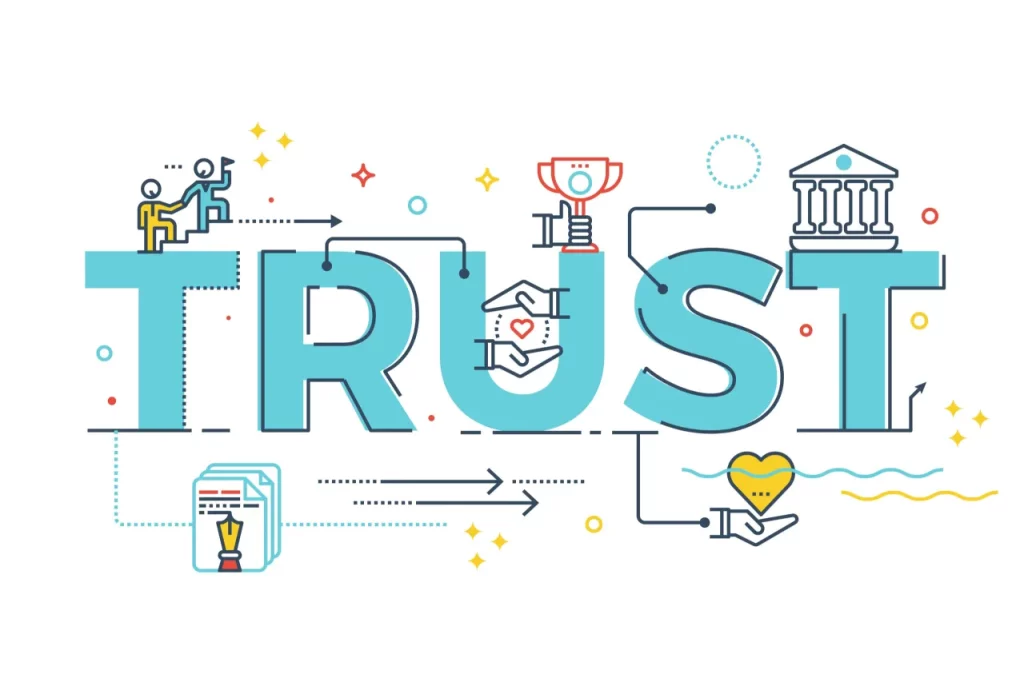
Menu

Menu

When trust is eroded within an organization, communication, teamwork, and performance all suffer significantly. Consequently, many companies are focusing on effective strategies to build trust with their employees. By fostering an environment of transparency and openness, organizations can enhance employee engagement and satisfaction. Moreover, strong trust among team members encourages collaboration, leading to improved teamwork and innovative problem-solving. Ultimately, cultivating trust not only boosts productivity but also contributes to higher employee retention in the process, as employees feel valued and supported in their roles.
So, what steps can you take to build a culture of trust in your organization?
Creating a personal connection by getting to know your colleagues is essential for fostering a positive work environment. One effective way to achieve this is through informal interactions, such as team lunches or team-building events. These opportunities allow you to engage with your coworkers in a relaxed setting, promoting open communication and camaraderie. Additionally, offering to occasionally share some of their workload sends a strong signal that you’re all in this together. By demonstrating your willingness to support each other, you not only strengthen relationships but also cultivate a collaborative atmosphere that benefits the entire team. Ultimately, these efforts contribute to a more cohesive and productive workplace.

A critical step in creating a trusting relationship with employees is to agree on a set of core values for the organization. These values not only set the tone for the company but also drive behaviors and decision-making at all levels. Moreover, as important as establishing core values is ensuring that they are consistently demonstrated and rewarded in everyday workflows. This alignment reinforces the significance of the values within the organizational culture. One effective practice is to embed these core values into the performance management of employees. By doing so, employees can see a direct connection between their contributions and the organization’s mission, ultimately fostering a deeper sense of trust and commitment. Consequently, this approach not only enhances employee engagement but also strengthens the overall integrity of the organization.
Colleagues should be encouraged to recognize both the characteristics they share and the qualities that make them unique. By fostering this understanding, teams can create a more inclusive and collaborative work environment. Furthermore, these shared values can be demonstrated through corporate social responsibility initiatives, highlighting how the organization engages with the community. Additionally, establishing formal and informal mechanisms, such as mentoring programs or team-building activities, can further promote peer support among employees. Ultimately, this approach enhances workplace relationships and contributes to a positive organizational culture that values diversity and inclusivity.
Often, the HR team is at the heart of employee communications, playing a vital role in fostering transparency and trust within the organization. The more openly management communicates, the greater the trust employees will have in their leadership. Therefore, it’s crucial for organizations to avoid creating voids in communication, as these can encourage a destructive rumor mill that undermines trust and fosters mistrust. While certain information, such as personal employee data, should remain confidential, there is a wealth of information that can and should be shared. For instance, transparency regarding financial results, company progress against targets, and planned initiatives significantly helps maintain trust among employees. Additionally, when employees are informed, they are better equipped to contribute to the organization’s growth and support innovation, ultimately leading to a more engaged and productive workforce.

Transparency also encompasses the necessity of communicating both bad and good news. When employees are informed about challenges as well as successes, they tend to be more resilient and adaptable. In fact, understanding what is happening within the organization equips employees to navigate uncertainties more effectively. Conversely, when employees are forced to work in a void of information, it can lead to feelings of insecurity and mistrust. Therefore, by fostering an environment of open communication, organizations empower their employees to engage meaningfully with their work and contribute positively to the overall culture.
Another essential element of transparency is ensuring that employees are aware of the data held about them and providing quick, straightforward access to company policies and procedures. By doing so, organizations not only empower their employees but also foster a culture of openness. To achieve this goal, it is crucial to automate record-keeping and employee transactions, ideally through an integrated HR management system (HRMS). This automation streamlines processes and enhances accessibility, allowing employees to easily retrieve important information whenever they need it. Furthermore, an efficient HRMS can facilitate better communication between employees and management, ultimately contributing to a more transparent and trusting workplace environment.
Employees are motivated when they are recognized for the work that they do. Moreover, reinforcing good work and positive behavior encourages everyone to work harder and smarter. In addition, another major benefit is that trust is built when employees observe fairness and equality in the way people are recognized. Consequently, there’s nothing worse than a manager taking credit for the work of their team, as this will inevitably lead to a quick loss of employee trust.
It’s also important to take responsibility when things don’t go well due to management decisions or actions. For instance, it’s too easy to blame employees for poor customer service when, in reality, the issue may stem from the fact that they are not empowered by the company to provide the level of service required. By acknowledging this, management can create an environment that fosters accountability and improvement.
A culture where everyone feels able to express their thoughts and ideas builds trust. Consequently, establishing innovation or idea schemes, where individuals can be recognized for their contributions, is a positive step to take. However, for this to happen, there must be a sense of equality and fairness, as well as a positive communication culture of trust. Furthermore, this approach encourages team spirit and enables people of varying skill levels to demonstrate the value they bring to the organization.
Make sure that you don’t encourage favoritism in the workplace. While it’s easy to become more connected with employees who are working hard and achieving more than their colleagues or with those who share similar backgrounds or interests, it’s crucial that this does not lead to treating them more favorably in a work context. Moreover, this tendency can be particularly destructive when giving preference to certain candidates during recruitment or in promotions. Therefore, you need to not only be fair but also be seen to be fair in your decisions and actions.
No one expects a manager to know everything about their job; however, it is important that you maintain your skills and knowledge if you are to earn employees’ trust. If you don’t know what your team members do, then take the time to find out. When employees understand that you are genuinely interested in their roles and the challenges they face, they are more likely to trust your decision-making and follow your directions. Additionally, this effort demonstrates your commitment to their success and fosters a more collaborative work environment.
Equally important is not pretending to know things that you don’t. In fact, experienced employees can quickly identify when you are bluffing. Therefore, it is far healthier to create an environment where you respect the knowledge and skills of your team members and actively seek their advice and ideas when needed. By asking questions, you not only demonstrate your interest but also show your appreciation for their contributions. Furthermore, this approach earns you their trust and fosters a collaborative atmosphere where everyone feels valued.

If you have established and delivered against your core values, then respect should be an integral part of your culture. Moreover, it’s important to maintain a focus on respect in all aspects of the workplace. One of the key elements is to ensure that gossiping and negative talk about others are actively discouraged and denounced. Indeed, allowing gossip and bad talk to flourish is a sure way to destroy trust across the organization. Furthermore, respect for colleagues and customers is a cornerstone of a healthy working environment, which drives other essential behaviors such as teamwork and innovation, as well as productivity. By prioritizing respect, organizations can foster a more collaborative and effective workplace.
In summary, building trust with employees takes time and requires consistent effort. Furthermore, it means focusing on communication and internal processes while ensuring fairness and transparency in every interaction. Although this may present several challenges, having the trust of your workforce ultimately drives productivity, ensures a healthy working environment, and leads to improved employee retention. By prioritizing these elements, organizations can create a more engaged and committed workforce.
HRBluSky aims to be a global leader in providing a better experience for employees and employers. Enabling you to manage your workforce from one central system, HRBluSky is a simple and user-friendly HRMS, giving your employees transparency and accessibility anytime, anywhere via their mobile devices.
Alignment
Article
Audit
Automation
Benefits
Candidate
Communication
Compliance
Digitalisation
Digital Technology
Diversity
Emirates Id Application
Employee Experience
ESS
Feedback
Health and Safety
HRMS
HR Strategy
HR System UAE
Human Resource Management
Human Resource Management Systems
Job Roles
Learning and Development
Onboarding
Outsource
Payroll
Payroll Management System
Payroll Processing
Performance
Performance Management
Personalisation
Recruit
Recruiting
Recruitment
Remote Working
Rewards
Security
Service Providers
Skills
Smart
Survey
Virtual
Visa Cancellation
Work Environment
Workforce
© 2026 Pruvity HR Solutions Pvt Ltd, Madurai, India